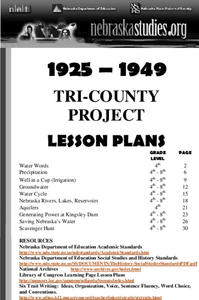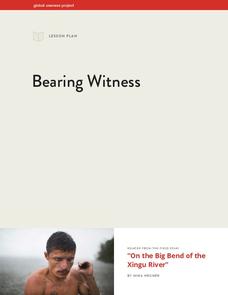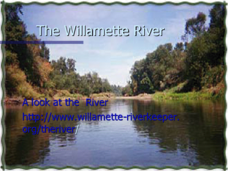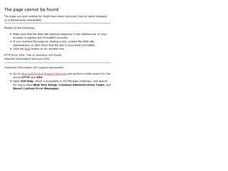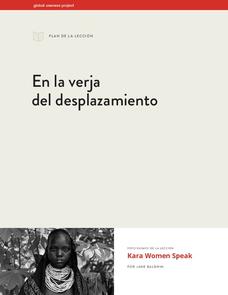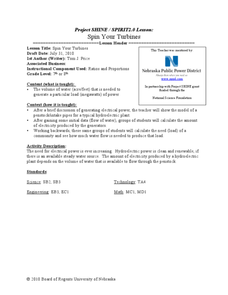Curated OER
Generating Power
Students construct a working model of a turbine and explain how water generates power. By the end of the lesson plan, they list the effects of Kingsley Dam on people, plans, and animals -- both positive and negative.
California Academy of Science
Optimal and Sustainable: Renewable Energy Revamp
More than 100 cities around the world have shifted from fossil fuels to renewable energy sources. Scholars investigate a city wanting to make this switch, but needs help determining how to make the shift. Groups consider all options,...
Scholastic
Study Jams! Electricity
Shock your physical science class using this video to teach the basics of static electricity. Electricity is defined,and electrons are differentiated from protons on an atom model. The use of hydropower and wind are explained as ways of...
Curated OER
Waterwheel Work
Students investigate the history of the waterwheel and common uses for water turbines today. They construct an experimental waterwheel using a two-liter plastic bottle, measure the rate of revolution of a waterwheel, and complete a...
Curated OER
Scavenger Hunt
Students summarize the "Tri-County Project" section of the nebraskastudies.org web site using a scavenger hunt.
Global Oneness Project
Bearing Witness
A controversial construction project in South America, the Belo Monte dam, is endangering local cultures, ecosystems, and communities. High schoolers create a concept map based on an online article they read before engaging in discussion...
Curated OER
Energy Sources
Students explore a variety of sources and types of energy. The difference between energy for a person and energy for an automobile are examined. Efficiency and care for the environment are included in this experience.
Curated OER
The Willamette River
An informative set of slides inspects the Willamette River. Hydropower dams, agriculture, and the presence of major cities on its banks have led to increased bacteria, temperature, and mercury content as well as skeletal deformities in...
Carnegie Mellon University
How Power Plants Work 1
First of three lessons, this is a great start to a unit on energy. As you demonstrate, learners discover different types of energy and how it is converted from one form to another. They then focus in on the generation of electricity by...
Government of South Australia
Don't Waste Your Energy
Don't lift another finger, this physical and environmental science unit has everything you need to begin teaching your class about energy. Starting with a look at the greenhouse effect, these lessons and activities take young scientists...
Curated OER
Two Ways About It
Students take an imaginary hike in two opposite directions along a lake. They view and interpret satellite images and discuss the pros and cons of hydroelectric dams.
Curated OER
Dam Identification
Young scholars identify and define Hydroelectric dams that provide us with electricity. Then they identify a variety of methods that have been used to try to help salmon make it past the dams on their journey to the sea. Students also...
Curated OER
Greenewables
Young scholars form expert engineering teams working for the (fictional) alternative energy consulting firm, Greenewables, Inc. Each team specializes in a form of renewable energy used to generate electrical power: passive solar, solar...
Curated OER
America's Energy Future
Students write a proposal to save energy resources. In this energy lesson, students research nuclear energy, coal power, petroleum, natural gas, hydroelectric power, and renewable energy. Students then debate energy issues and share...
Teach Engineering
Win that Bid! Selling Your Power Solution
Power up! Class members research a type of power production using a great resource featuring a real-world problem. Groups select a type of power generation and pretend that they represent an engineering firm for their chosen power type....
Society of Petroleum Engineers
Renewable and Nonrenewable Energy
Energize an environmental science unit on natural resources with this collection of instructional materials. From simple coloring sheets for primary grade children, to guiding questions for a high school research report, a wide variety...
Tennessee Valley Authority
Renewable Energy Sources
Not all energy sources are renewable, as learners investigate in this unit. Made up of six lessons that span a few weeks of instruction, the unit has learners examining US energy reserves and consumption, using data to draw conclusions...
National Energy Education Development Project
Great Energy Debate
If someone yelled for eight years and eight months, they could produce enough energy to heat one cup of coffee. A lesson on energy encourages scholars to research 10 different energy sources in groups before playing a game. Twenty...
Pace University
Grades 9-10 Energy Sources
Alternative energy sources are becoming increasingly important. Learners have the opportunity to explore alternative energy sources using a differentiated instruction unit. They group together based on ability levels, assign roles to...
Bonneville
Informative Writing: Where Does Energy Come From?
Get energized about all the different sources of energy. A research project has scholars investigate a renewable or non-renewable energy type of their choice. They write a report on their findings and decide on a way to publish their work.
Global Oneness Project
On the Verge of Displacement
By having scholars tackle this interdisciplinary lesson, they'll see how social studies and environmental science are related as they explore the impact that the construction of a dam will have on the population and ecosystem of the Omo...
Curated OER
A Case of Innovation
Students use strategies to comprehend technical writing. They write reports with great detail, supporting material, and clear vocabulary. They incorporate source materials into their speaking and writing and use voice, tone, and style.
Curated OER
Power In Variety
Students discover different types of energy. In this energy source lesson plan students compare different types of energy, renewable and nonrenewable. Students answer questions about the different types of energy and their impact on the...
Curated OER
Spin Your Turbines
Students relate electrical power and how it works to math. In this geometry lesson, students analyze how a hydroelectric plant works and calculate the amount of electricity that is produced by a typical generator. This lesson uses...






